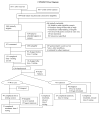Cardiac autonomic control and treatment of hostility: a randomized controlled trial
- PMID: 20028833
- PMCID: PMC3647338
- DOI: 10.1097/PSY.0b013e3181c8a529
Cardiac autonomic control and treatment of hostility: a randomized controlled trial
Abstract
Objective: To test whether reduction in hostility increases autonomic regulation of the heart.
Methods: In this randomized controlled trial, participants were 158 healthy adults, aged 20 years to 45 years, who were 1 standard deviation (SD) above national norms on the Cook-Medley Hostility and the Spielberger Trait Anger Indices. Participants also were interviewed, using the Interpersonal Hostility Assessment Technique (IHAT). They were randomly assigned to a 12-week cognitive behavior therapy program for hostility reduction or a wait-list control condition. The main outcome measure was cardiac autonomic modulation, measured as RR interval variability (RRV) derived from 24-electrocardiographic recordings.
Results: In a multivariate analysis of variance assessing psychological outcomes of hostility, anger, and IHAT scores, there was a significant treatment effect with an average reduction across the three outcomes that was approximately 0.7 SD (ES = 0.685, SE = 0.184, p < .001) greater for the intervention group than for the control group. In contrast, the change in heart rate was -0.14 beat/min (95% Confidence Interval [CI] = -2.43, 2.14) in treatment participants and -1.36 beat/min (95% CI = -3.28, 0.61) in wait-list participants. High-frequency RRV, an index of cardiac parasympathetic modulation, increased by 0.07 ln ms(2) (95% CI = -0.10, 0.24) for participants in the treatment condition and decreased by 0.04 ln ms(2) (95% CI = -0.18, 0.10) for participants in the wait-list condition. These differences were not significant. The findings for other indices of RRV were similar.
Conclusions: Reduction of hostility and anger was not accompanied by increases in cardiac autonomic modulation. These findings raise questions about the status of disordered autonomic nervous system regulation of the heart as a pathophysiological mechanism underlying the hostility-heart disease relationship and about whether hostility itself is a mechanism or merely a marker of elevated risk of heart disease.
Figures



References
-
- Wilkins R. The Doctor’s Quotation Book. New York: Barnes and Noble Books; 1992.
-
- Barefoot JC, Larsen S, Von der Lieth L, Schroll M. Hostility, incidence of acute myocardial infarction, and mortality in a sample of older Danish men and women. Am J Epidemiol. 1995;142:477–84. - PubMed
-
- Everson SA, Kauhanen J, Kaplan GA, Goldberg DE, Julkunen J, Tuomilehto J, Salonen JT. Hostility and increased risk of mortality and acute myocardial infarction: The mediating role of behavioral risk factors. Am J Epidemiol. 1997;146:142–52. - PubMed
-
- Matthews KA, Gump BB, Harris KF, Haney TL, Barefoot JC. Hostile Behaviors Predict Cardiovascular Mortality Among Men Enrolled in the Multiple Risk Factor Intervention Trial. Circulation. 2004;109:66–70. - PubMed
-
- Everson SA, Kauhanen J, Julkunen J, Kaplan GA, Goldberg DE, Salonen R, Salonen JT. Cynical hostility and the progression of carotid atherosclerosis. Annals of Behavioral Medicine. 1997;19 (Suppl):S073.
Publication types
MeSH terms
Grants and funding
LinkOut - more resources
Full Text Sources

